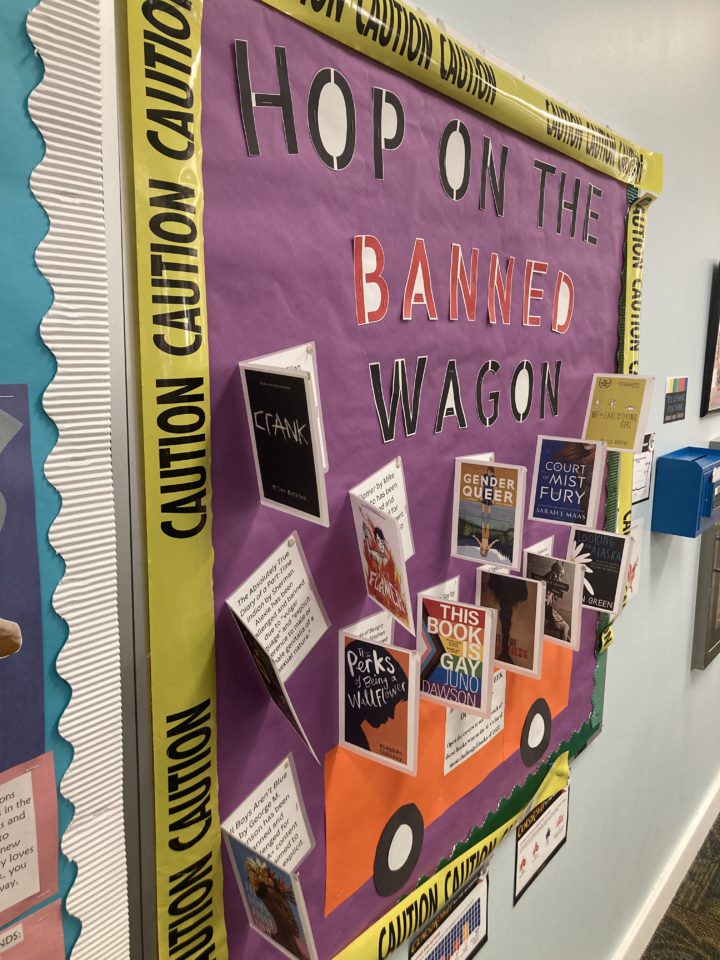In 2023, the conversation around what books belong in school and public libraries intensified as some questioned local school and library boards during public meetings about what types of titles should be available to children.
Locally, Ronald Gates, pastor of Greater Works Church, and others have made frequent appearances at school board meetings to argue that various books — usually related to sexual health or depicting LGBTQ+ students and families — don’t belong in libraries accessible to children. In neighboring Burnsville, a display at the Yancey County Public Library celebrating LGBTQ+ topics and authors offended some library patrons, leading to a change in membership on the county Public Library Advisory Board, which is appointed by the Yancey County Board of Commissioners.
Nationwide, according to the American Library Association, there were 1,269 requests to censor library books and resources in 2022, the most since the ALA began compiling data more than 20 years ago. The total 2,571 titles challenged in those requests was a 38% increase over 2021, according to ALA’s data. The vast majority of titles targeted for censorship in 2022 were about the LGBTQ+ community and people of color, said ALA communications specialist Raymond Garcia in a press release.
Despite the noise, neither Asheville City nor Buncombe County Schools has received a formal book ban request this year, as of mid-November, according to district spokespeople. In the Buncombe County Public Libraries system, requests for reconsideration are also rare.
Buncombe County Public Libraries Director Jason Hyatt says the system typically sees fewer than five a year, and since he started as director in January, there have been four requests, including one for the movie Rocketman, the musical based on the life and career of Elton John.
The latest edition of Xpress’ WTF — “Want the Facts?” — series looks at the policies and procedures that determine how books are chosen for school and county libraries.
‘Freedom to read’
There is no motive behind making certain titles available to the general public other than to give as many options as possible that could inspire someone to read, Hyatt says.
For the most part, librarians make a wide range of books available, leaving it up to parents to decide which are appropriate for their children, he adds.

The library follows professional standards, such as the ALA’s Library Bill of Rights, for its collection development policy, which is reviewed and revised every three years by staff members. Materials selection is “based on knowledge of the diverse needs of the entire community” while also considering the “merits of the work,” according to the policy.
“It’s a very solid policy, I think that it clearly outlines the things that are considered. It leaves room for professionals to make informed decisions about the items that they add to the collection,” Hyatt says.
Ultimately, the library attempts to mirror the values of the community it serves, Hyatt says, but errs on the side of inclusion, even if a title is controversial.
“The library affirms the public’s right of access to a broad spectrum of reading, listening, and viewing materials, and upholds the right of any individual to secure information, even if the content may be controversial, unorthodox or unacceptable to others,” the collection development policy reads.
“While anyone is free to select or reject materials for themselves or their own minor children, the freedom of others to read or inquire will not be restricted,” it continues.
Basically, librarians don’t want to be in the position of making decisions for readers but simply want to give readers the opportunity to decide for themselves, something that would not be possible if a title wasn’t made available, Hyatt says.
In the schools
In the schools, decisions are made by media coordinators at the school level in collaboration with each school’s media and technology advisory committee, says Janet Fraizer, instructional technology and media systems facilitator for Buncombe County Schools.
Schools’ selections involve an assessment of the available resources and curriculum needs of the school, as well as individual teaching and learning styles.
Similar guidelines are used by the schools as the public libraries, with more emphasis on an item’s “educational significance and direct relationship to instructional objectives and curriculum,” according to BCS’ policy.
Asheville City Schools has a similar collection policy, with each school’s librarian taking the lead in a collaborative effort to match a school collection with the educational goals and needs of the student population.
“The goal is to curate a diverse and engaging range of resources that cater to the educational needs, interests and growth of students at various stages of their academic journey,” says Dillon Huffman, a spokesperson for ACS who recently left the district.
Request for reconsideration
If you or your child does come across a book or other media that you believe should not be accessible in a public library, there is a process to ask that it be removed.
At the public library, anyone can fill out a statement of reconsideration form, found on the library website or at any branch. Once submitted, the Collection Development Team reviews it and makes a recommendation to the Library Advisory Board, which then makes a recommendation to the library director at one of its meetings. The library director makes the final determination and will respond in writing to the original request within eight weeks, according to the policy.
Similarly, anyone can make a request to add to the library’s collection, which goes through a similar process.
For classroom materials, parents may submit a challenge to any textbook or supplementary materials to the principal, who “may establish a committee to review the objection,” according to ACS’ policy 3210, parental inspection of and objection to instructional materials.
If a parent disagrees with a principal’s decision, it can be appealed to the superintendent and ultimately the Asheville City Board of Education, if necessary.
BCS’ policy is more specific, outlining that a school Media/Technology Advisory Committee — made up of a “site-based administrator, parent, teacher and coordinator” — will review the material and issue a recommendation to the principal. Appeals can be made directly to the Buncombe County Board of Education.
“While input from the community may be sought, the board believes professional educators are in the best position to determine whether a particular instructional material is appropriate for the age and maturity of the students and for the subject matter being taught,” according to both districts’ policies.

Public displays
Also under fire recently are library displays, often near entrances. Hyatt says staff members consider not only current events and trends but topics that they’d like to highlight that might otherwise not get much attention.
Display topics have ranged from African American history in mid-June to celebrate Juneteenth to the history of pasta and how to cook it during National Pasta Month in October.
“Our intent with every display is to highlight materials that we own and give people a chance to see those items and possibly decide to check them out. [We] treat it like merchandising. We use displays as a way to draw attention to new titles and unique titles and help keep things circulating across the county,” he says.
In that way, libraries are not unlike a bookstore, he says.
“There’s not a larger or deeper meaning to any of our displays other than encouraging people to read, making them aware of the things that we have available. There are times that we have displays that are very intentionally aligned with Buncombe County’s core values. And so we make sure that those displays are right in line with the things that Buncombe County believes in,” he says.




Before you comment
The comments section is here to provide a platform for civil dialogue on the issues we face together as a local community. Xpress is committed to offering this platform for all voices, but when the tone of the discussion gets nasty or strays off topic, we believe many people choose not to participate. Xpress editors are determined to moderate comments to ensure a constructive interchange is maintained. All comments judged not to be in keeping with the spirit of civil discourse will be removed and repeat violators will be banned. See here for our terms of service. Thank you for being part of this effort to promote respectful discussion.